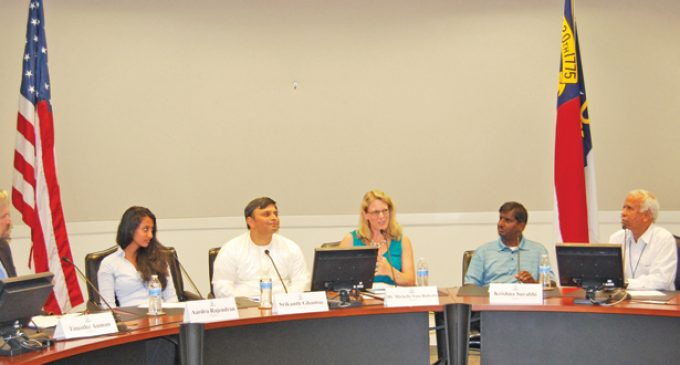Hindus respond to shooting of local temple sign

Above: Photos by Todd Luck- Wake Forest University theology professor Michelle Voss Roberts (center) speaks as the other panelists look on.
Panelists answer questions on Hinduism
Panelists in a forum on Hinduism said that the local Hindu community remained hopeful after a sign for the Winston-Salem Hindu Temple was shot through in July.
The forum, “I Have a Question About Hinduism,” was the latest in the city of Winston-Salem Human Relations Commission’s series on religion. The sign, which gives the temple’s name, address and contact information, sits on 7.6 acres of land in Clemmons that has been purchased for the proposed temple. It was shot at in mid-July with a shotgun, which left more than 60 holes in the sign. It’s still unknown who did it or why.
Human Relations Department Director Wanda Allen-Abraha said that the panel was held in response to the incident.
The panel included members of the area Hindu community and Michelle Voss Roberts, associate professor of theology at Wake Forest University. Krishna Surabhi, secretary of the Winston-Salem Hindu Temple, said the Hindu community was disappointed in the act, but was also reassured by the affirmation the temple got from nearby churches.
“The response from the community, the Hindu community as well as other religious communities, has been very supportive,” he said.
Winston-Salem Temple president Manjunath Shamanna said the shooting made some local Hindus scared to come to the site of the future temple, where events are regularly held. He said between the community support the temple has gotten and police that have been at the temple’s bigger events, that fear is starting to fade.
“Hopefully, going forward the community will realize that there is nothing to fear, when we stand together as a society, as a Winston-Salem society, we can face these kinds of things,” he said. Shamanna, who is also a Human Relations commissioner, said that vandalism of places of worship is not unique to Hindus. Since the incident, he’s had Christian friends tell him how their churches had been vandalized at various points.
It’ll be next year before construction begins on the temple, which is in the planning and fundraising stages. Events, such as prayers on Saturday, are currently held on the site. The closest temple for the 500 Hindu families estimated to live in Forsyth County is the Hindu Temple of the Triad in McLeansville, near Greensboro. Those who can’t make it there during the time it’s open have to travel to temples in other parts of the state like Charlotte.
The panel was asked to help define Hinduism by moderator the Rev. Tim Auman. Srikanth Ghantae, president of the Triad Hindu Temple, said that Hinduism involves a belief in the oneness of all things and its connectedness to the creator
“Every thing and every being has a purpose,” he said.
Panelists said Hinduism believes in a creator or consciousness that takes the form in many gods and goddesses. Hinduism incorporates many different beliefs and is accepting of however people wish to view and worship the divine.
When the panel was asked about the caste system, which is class system based on birth and occupation that was practiced in India, Ghantae said it was a sour subject. He said Hindus realized it was a mistake and India is trying to move beyond it.
Aardra Rajendran, a local resident and president of the University of Pennsylvania Hindu Student Council, said the caste system was similar to divisions and inequalities experienced in societies through history, including in the United States.
“We see America facing these issues of inequality and justice and social power struggles, and this is something that India is really struggling with now, too, and hopefully moving forward in progress,” she said.
She said that young people today are drawn to aspects of Hinduism about equality and peace.
“Youth are so much more drawn toward the core principals of non-violence, of peace, of seeing divinity in all people, of seeing the importance of nature and seeing the interdependence of man with nature, of recognizing the fundamental humanity of all beings because all beings are part of the supreme soul.”
The panel was also asked about the Hindu roots of Yoga, which started as a philosophy that “yokes” the mind and body to reach a transcendental state, and the red dot sometimes worn on the forehead by Hindus, which marks a sacred spot of the body and invokes their internal power and their connection to higher divinity.
Auman, a Human Relations Commissioner and WFU Chaplain, said that the university is starting a Hindu student society this semester.
















